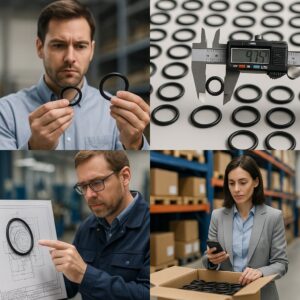Tech News
What Procurement Managers Should Ask Before Buying O-Rings in Bulk
When you’re planning to buy O-rings in bulk, the smartest thing you can do is ask the right questions before signing anything. Finding a dependable seal O Ring supplier isn’t only about price. It’s also about making sure their products and systems truly fit the way your operations run.

So, before you place that next order, it helps to pause and think about what to ask to keep performance, consistency, and supply on track.
What Material Composition Best Fits the Application?
Each industry environment places different stress on O-rings, so matching the right material to the job is essential.
Here are some of your options:
- EPDM works well for potable water systems because it handles water and steam;
- Viton FKM suits oil, gas, and chemical exposure;
- Nitrile (NBR) is ideal for fuel and hydraulic fluids; and
- Silicone performs well in extreme temperatures.
There are other factors to consider as well.
- Temperature and pressure range
- Type of fluid or chemical exposure
- Regulatory or safety certifications required
Selecting the right compound helps prevent early wear and keeps maintenance predictable.
How Consistent Is the Supplier’s Quality Control?
Every batch of O-rings should perform the same as the last. That’s why consistent quality control systems matter so much.
Suppliers that operate under ISO 9001 or IATF 16949 standards mean that they can guarantee reliable testing, traceability, and precision manufacturing. High-quality assurance ensures products remain within tight tolerances to ensure reduction of costly downtime.
Ask how often materials are tested, how results are documented, and whether independent inspections are part of the process. This confirms that what you buy meets the same standard every time.
Can the Supplier Provide Custom Design or Engineering Support?
When you need O-rings for special machines or new equipment, it helps to work with a supplier that can design and build parts made just for you. They can make new moulds, change how soft or firm the rubber is, or shape the O-ring to fit your machine perfectly.
Many technical suppliers now offer concept-to-delivery services that include design consultation, rapid prototyping, and testing support. This saves time during development and reduces the risk of mismatch during installation or operation.
What Are the Lead Times and Supply Capabilities?
A good supplier should deliver large or repeat orders without production delays. Before committing, ask about current stock levels, lead times, and manufacturing capacity. Consistent production scheduling and flexible logistics support are signs of a reliable partner.
Some suppliers maintain both local distribution and international manufacturing, which helps shorten turnaround times and protect against raw material shortages. Understanding how they manage high-volume or urgent requests can save your operations from disruption later on.
Need seal rings and other precision-engineered components? Talk to Gulf Rubber.





